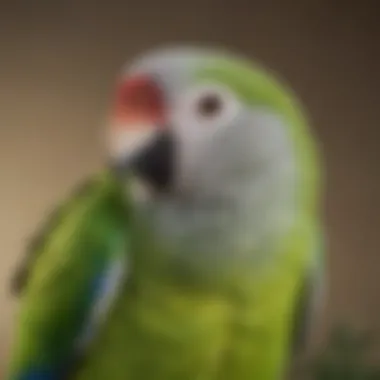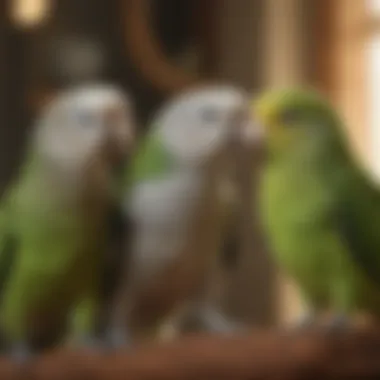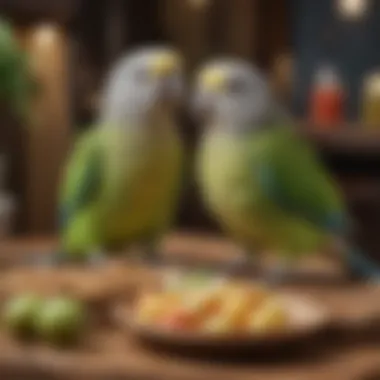Discover the Unique Traits and Care of Quaker Parrots


Intro
Quaker parrots, also referred to as monk parakeets, are an engaging and intelligent species of parrots, becoming quite popular among avian enthusiasts. Known for their vibrant personalities and social nature, they offer unique companionship to those willing to meet their specific needs. This article aims to inform bird owners and prospective guardians on care practices, socialization, and the emotional bonds involved in Quaker parrot ownership. Understanding these specific traits ensures that caregivers can nurture the overall health and well-being of their feathered friends.
Avian Care Basics
Proper care of Quaker parrots begins with understanding their unique requirements. These small but charismatic birds merit a suitable environment, conscientious nutrition, lifelong grooming, and hygiene practices. This foundation establishes the well-being that Quaker parrots thrive upon.
Importance of Proper Nutrition
Nutritional needs cannot be undervalued in the longevity and health of a Quaker parrot. They have specific dietary requirements that should be met. A combination of high-quality pellets, fresh fruits, and vegetables, alongside occasional treats, ensures a balanced diet. Always remember to avoid foods unrealated to their needs, such as avocados and chocolate, which may prove harmful.
Understanding Bird Species and Their Needs
Awareness of the species's inclinations aids caregivers in providing a proper environment. Quaker parrots are social, intuitive, and require stimulation. They may thrive better when housed in pairs or groups to facilitate social interactions.
Basics of Birds Habitat Setup
Creating an adequate habitat is essential. Intervention space requirements should accommodate their need for movement. Standard guidelines include a spacious cage, numerous perches of different dimensions for foot health, and safe toys for mental engagement, varying from wood to rope materials.
Grooming and Hygiene Tips
Cleanliness directly correlates with a bird's health. Regular cleaning of perches, toys, and food dishes prevents infections. Bathing, either through misting or shallow water bowls, is also key to maintaining feathers in top condition and helps promote bonding between the owner and pet.
Interacting with Your Pet Bird
Interpersonal connection between owner and Quaker parrot is fundamental for emotional well-being. Activities can nurture this bond, thus decreasing chances of behavior problems down the road. Knowing how to interact correctly can lead to a mutually rewarding experience.
Building Trust and Connection
Creating trust takes time. Gentle hand movements, consistent talking, and quiet demeanor encourage comfort. Treats serve not only as love but also as an effective way to reinforce positive behaviors, creating a close connection over time.
Training Techniques and Tips
A well-trained Quaker parrot displays less unwanted behavior and thus better adapts to its environment. Basic commands and behavioral diversions can be taught with repetitive practices, delightful reinforcements and patient methodologies.
Fun Activities for Bird Owners and Their Birds
Engagement does not always require elaborate setups. Simple games can arouse curiosity and interaction. Towards this, initiatives like helping the bird identify an object can keep them mentally stimulated, fostering energy.
Recognizing Bird Cues and Behaviors
Understanding bird behaviors enriches ownership experiences. Knowing when your Quaker parrot feels happy, uncertain or stressed can alter your approach fit to their current emotional state, leading to improved interactions.
Emotional Well-Being of Birds
Togetherness with any pet profoundly shapes its quality of life. Avian companions such as Quaker parrots require a conducive atmosphere where they can feel safe and emotionally stable.
The Role of Play and Socialization
These birds are inherently social and active. Ongoing social interaction usually influences happiness and diminishes stress. Regular playtime, either with the owner or partners can be beneficial for enhancing overall emotional health.
Enhancing Birds' Emotional Health
Apart from physical activities, stimulating environments filled with thought-provoking toys or games can aid cognitive function and emotional well-being. Engaging their instinctual tendencies reinforces their natural behaviors positively.
Assessing Bird Stress and Remedies
Recognizing signs of stress in Quaker parrots, such as excessive screeching, plucking feathers or withdrawal behaviors is an important step. Correct measures may involve reassessing their environments or, particularly in high-stress episodes, altering their living spaces.
Building Strong Human-Bird Bonds
Finally, building lasting connections leads to fulfilling experiences for both birds and their owners. Mutual trust allows for authentic communication, enhancing appreciated moments and minimizing relevant behavioral issues.
Bird Health and Safety
Safeguarding avian health remains an continuous obligation in pet ownership. Being proactive in understanding symptoms of distress ensures the bird remains happy and thriving.
Common Health Issues and Prevention
Quaker parrots can face problems, such as malnutrition or respiratory infections, primarily from neglected hygiene. Staying vigilant through longstanding observations enables early intervention, combating foreseeable health concerns.
Routine Veterinary Care
Regular visits to a qualified avian veterinarian cannot be overstated. These assessments establish routine adequacy, longer life spans and ensure underlying issues do not develop further.


Environmental Hazards to Avoid
Awareness of dangers in domestic spaces is critical. Ventilation should be sufficient, while chemical sprays and toxic substances cleaned up immediately observe alongside delicate restaurant dietary habits for keeping airlines utmost secure.
Signs of Illness or Distress
Understanding indicators of distress in Quaker parrots is fundamental for effective care. Dull feathers, lethargy or avoidance of favorite activities signify focus is needed in their overall health management.
Fun Facts and Quirky Insights
The captivating world of Quaker parrots offers not only guidelines for care but also intriguing nuggets of information. Exploring these facets instills appreciation for both the species's behavioral idiosyncrasies and customs across the globe.
Unique Traits of Popular Bird Species
Quaker parrot's propensity for mimicry has given rise to their flavorsome voices matched by energetic tendencies. Their charming antics encapsulate their identity in household settings—captivating interactions reflect unique relationships commonly built with many owners.
Historical and Cultural Significance of Birds
Beyond family dynamics, birds hold historical importance many societies recognized early. Notably, these feathered comanions symbolic capture the aspects of communication, acting almost as messengers.
Famous Bird Owners and Their Stories
Many historically significant figures hold pets close taking inspired tales generally feature stories of companionship drawing important passion exceeding multi-divide many human generations.
Understanding Quaker Parrots
Understanding Quaker parrots is essential for those who consider keeping them as pets. This section helps bird owners appreciate the species' unique traits and complex needs. By recognizing the background, physical attributes, and variety of Quaker parrots, owners will be better prepared to meet their pets' needs effectively.
Origin and History
Quaker parrots, also known as monk parakeets, originate from South America. They have managed to adapt and thrive in various environments, stretching from parts of Argentina to southern Brazil. They were first documented as a pet species in the early 20th century, leading to their popularity in aviculture.
The name
Behavioral Traits of Quaker Parrots
Understanding the behavioral traits of Quaker parrots is crucial for current and future pet owners. These traits define the lifestyle needed for their care, socialization, and overall health. Recognizing these traits also allows for a better relationship between the bird and its owner. With this knowledge, bird owners can create a positive and stimulating environment that promotes well-being. In this section, we take a closer look at social interaction, vocalization patterns, as well as playfulness and curiosity, highlighting why each element is significant in the care of Quaker parrots.
Social Interaction
Quaker parrots are inherently social beings. They thrive on interaction with humans and other birds. Owning a Quaker parrot often means having a constant companion. Their social nature demands regular stimulation, both cognitively and emotionally. If not engaged, they might show signs of distress or behavioral issues.
Interactive play is vital for these birds. Activities such as offering toys, providing climbing structures, and engaging in bonding activities can fulfill their social needs. interaction is not just play; it can also take the form of simple conversation. Quaker parrots are known for mimicking human speech, showcasing their ability to connect. The more time spent with them, the stronger the bond you can build.
Habitat Setup for Quaker Parrots
Creating an appropriate habitat for Quaker parrots is essential for their health and overall well-being. An ideal living environment not only promotes physical health but also supports the bird's social and psychological needs. Quaker parrots are social creatures; thus, providing a structured yet stimulating habitat translates into happier and more interactive pet birds.
Cage Requirements
Selecting the right cage plays a critical role in a Quaker parrot's habitat. Cage size is important, as these birds require ample room to fly and explore. A larger cage allows for more freedom and helps reduce stress levels.
- The cage should ideally measure at least 24 inches wide, 24 inches deep, and 30 inches tall. This size allows for comfortable movement.
- Bar spacing is another important consideration. Bars should be spaced no more than ½ inch apart to prevent escape or injury.
- Incorporate various perches and shelves of differing sizes and textures. This will provide opportunities for climbing and resting.
Additionally, the cage should be easy to clean. Birds may create mess through food and droppings, requiring regular maintenance. Opt for a cage with a removable tray or one that can be easily disassembled.
Environmental Enrichment
Environmental enrichment is vital to keep a Quaker parrot engaged. These birds are intelligent and naturally inquisitive; hence, they thrive in environments that stimulate their mental abilities. To enhance their surroundings:
- Toys are a must. Durable chewable toys and ropes contribute to both play and exploration. Rotate them regularly to maintain interest.
- Providing foraging opportunities stimulates their natural behavior. Hiding food within toys or in different areas of the cage can promote natural scavenging behaviors.
- Incorporate natural elements, such as branches or non-toxic plants, safely inside their cage. This helps mimic their native habitat, encouraging both climbing and chewing.
Regular interaction and time outside the cage can also foster physical activity and mental stimulation. However, ensure the environment is safe, free from potential hazards like toxic plants or unsafe materials.
Temperature and Humidity Considerations
Quaker parrots thrive in specific temperature and humidity ranges. Keeping them comfortable is paramount for either health or longevity.
- The ideal temperature for these birds is between 65°F and 80°F (approximately 18°C to 27°C). Ensure that their environment is away from drafts, direct sunlight, or heat sources, as fluctuations can cause stress or health issues.
- Humidity levels should be maintained at around 40% to 60%. Excessively dry air can lead to health issues, while overly humid conditions can promote maladies, such as feather plucking or fungal infections. Using a humidifier may be needed if you live in a dry climate.
By taking a comprehensive approach to the habitat setup for Quaker parrots, owners contribute significantly to their happiness and welfare. Remember that a well-planned environment not only addresses physical needs but also nurtures behavioral health, shaping these social creatures into happy companions.
Dietary Needs of Quaker Parrots
Understanding the dietary needs of Quaker parrots is crucial for ensuring their overall health and happiness. These birds, known for their sociability and intelligence, rely on a well-balanced diet tailored to their unique requirements. A proper diet not only supports their physical health but also affects their behavior and emotional well-being. Meeting their nutritional needs can positively influence their vitality, plumage condition, and interactive patterns, making caregivers more equipped to manage daily challenges.
Essential Nutritional Components


Quaker parrots require various essential nutrients in their diet:
- Pellets: These should be a staple. Top-quality commercial pellets are formulated specifically for parrots, providing balanced vitamins and minerals.
- Seeds: While seeds can be part of a diet, they shouldn’t dominate. Use them as a treat since they often are high in fat.
- Fruits: Fresh fruits like apples, bananas, and berries offer vitamins andencourage hydration.
- Vegetables: Colorful veggies such as spinach, carrots, and peppers are critical for their nutrient intake. Greens are particularly beneficial.
Providing a mix ensures that no single nutrient becomes deficiency, promoting overall health for your Quaker parrot.
Common Foods and Treats
When considering treats or supplementary foods for your Quaker parrot, it’s important to choose healthy options:
- Nuts: Occasional treats of unsalted almonds or walnuts can provide enrichment. Remember to limit these due to high fat content.
- Cooked Grains: Offering brown rice or quinoa can enhance their diet with complex carbohydrates. This is ideal for active birds.
- Berries and Melons: Blueberries have antioxidants and can be a delicious treat.
Feed these items in moderation, as treating should not replace its main diet.
Foods to Avoid
Bird owners must also understand what Quaker parrots should never consume:
- Avocado: This is toxic for many bird species. It must be avoided for safety.
- Chocolate, Coffee, and Caffeine: These substances can be harmful, affecting their hearts.
- Deep fried and fatty foods: High-fat human food can lead to obesity and diet-related diseases.
- Certain Vegetables: Avoid feeding them onions and garlic, as these can be toxic.
Always research before introducing new foods to ensure safety and health maintenance for your Quaker parrot.
A proper diet is not only vital for physical wellness but also enhances emotional stability and bonding opportunities between pet birds and owners.
Health Care for Quaker Parrots
Health care is essential for the well-being of Quaker parrots. Their vibrant spirits and lively nature offer companionship, but this comes with a responsibility to ensure they remain healthy. A balanced life for these birds includes medical attention, routine care, and understanding their unique health concerns. The wellness of a Quaker parrot affects its behavior, diet, and overall happiness. Therefore, providing proper health care is vital for fostering a long and fulfilling relationship with these intelligent companions.
Routine Veterinary Care
Regular veterinary visits are crucial for Quaker parrots. These check-ups can catch health problems early, before they become serious. Experienced vets who specialize in avian care can offer insights on diet, environment, and behavior. Typically, routine care should include:
- Annual physical exams to assess general health.
- Vaccinations, if recommended based on exposure risks.
- Smal procedures for nails and feather trimming, as necessary.
- Caution in discussing signs of illness with a vet.
Quaker parrots can mask their discomfort, making it easy to miss critical signs. Thus, understanding normal behavior helps in recognizing deviations.
Identifying Common Health Issues
Being familiar with common health problems in Quaker parrots assists in early diagnosis. Some common health issues include:
- Feather Plucking or Damaging: This behavior can indicate stress or boredom. 가능성 usually stems from a lack of mental stimulation. Treatment includes providing more enriching experiences.
- Respiratory Infections: Breathing issues can result from poor cage environment (ensure proper ventilation). Monitoring them closely for signs such as sneezing or labored breathing can help.
- Obesity: Correct diet and exercise are vital. Obesity can lead to numerous health concerns. Regular weight checks can help maintain a healthy weight.
- Psittacosis: This disease can affect both birds and humans. Symptoms vary but include lethargy, dry skin, and appetite loss.
Each potential issue needs a quick response to limit worsening health.
Preventative Health Measures
Preventative care significantly impacts Quaker parrot health. Notably, several simplw practices can protect overall well-being:
- Immunization: Considering available vaccines is crucial for preventing illnesses that may influence health.
- Sock Everything from Diet to Housing: Provide balanced, appropriate nutrition, including fresh veggies and occasional treats.
- Regular Cleaning of Aviaries: Dirty living conditions can foster parasites and diseases.
- Stimulating Environment: Engage them with a variety of toys and perches. Enrichment activities can prevent physical or psychological issues.
If attentive to their needs, we might peak into Contented NEXT generations of Quaker parrots. Their health not only helps them but enhance humans' connectivity with these lively creatures.
“A bird in a healthier cage is one that sings with joy.”
Socialization and Training
Socialization and training are crucial elements of good Quaker parrot care. Understanding these aspects can lead to a more harmonious coexistence between you and your pet bird. A well-socialized Quaker parrot is generally more adaptable, happier, and less prone to behavioral issues. Without proper socialization and training, these intelligent birds may develop habits that are not conducive to a positive life at home.
Importance of Socialization
Quaker parrots are highly social creatures. They naturally live in colonies and depend on social interaction for their overall well-being. If a Quaker parrot does not receive adequate socialization, it may exhibit behavioral problems such as aggression, excessive screaming, or feather plucking.
Taking the time to introduce your bird to various environments, people, and excellent stimulating toys is fundamental. This can not only help build confidence but also minimize stress. Birds that feel secure in their environment are typically more sociable and engage positively with their caregivers.
Social interaction should begin as early as possible. Puppies and kittens are often socialized at a young age, and the same principle applies to birds. They benefit from a rich tapestry of experiences that can shape their behavior throughout adulthood. Allowing them to explore different spaces safely can enhance their social skills.
Basic Training Techniques
Training Quaker parrots can be a rewarding experience. Using consistent techniques, you can communicate effectively and establish an understanding between you and your bird. Here are important aspects of basic training:
- Positive Reinforcement: Use treats and praise to reward desired behavior. Choose your bird's favored snacks, as this positively affects training success.
- Command Training: Simple commands like “step up” or “come here” are effective first steps. Begin saying the command while gently guiding your bird with your hand.
- Clicker Training: This method involves using a clicker sound to mark positive actions followed by a reward. It builds strong associations between the behavior and the response, creating clarity for the bird.
Establish short training sessions approximately 5 to 10 minutes long. Many seminars point out that short bursts of training yield better long-term adoption of skills. What’s key is your patience and consistency, leading to successful training outcomes.
Dealing with Behavioral Issues


Behavioral issues may arise even with properly trained and socialized Quaker parrots. Understanding the root cause of these actions is crucial before addressing them effectively. Some common issues include:
- Screaming: Implement alternatives, such as offering plenty of toys for engagement or your company instead of encouraging entertainment via screams.
- Aggression: If your parrot bites or lunges, assess any triggers and avoid escalating the situation. Gradual desensitization may be helpful.
- Destructive Behavior: Chewing is natural, but redirect destructive tendencies to appropriate toys.
Most importantly, the support of a veterinarian or an avian behaviorist can provide valuable insight necessary to approach these problems systematically. Understanding that behavioral changes often signify underlying issues aids you in providing appropriate care for your feathered friend.
“Education is a progressive discovery of our own ignorance.” – Will Durant
With effective socialization and solid training techniques, your relationship with your Quaker parrot can flourish. Understanding their emotional needs is paramount, ultimately leading to a rewarding experience for both you and your bird.
Emotional Bonds with Quaker Parrots
Emotional connections with Quaker parrots are crucial in understanding their care needs and behavioral traits. These bonds evolve through consistent interactions, forming a mutual trust between the bird and its owner. The warmth and familiarity that develop in these relationships are enriching for both parties.
Bonding Techniques
Building a strong emotional bond with your Quaker parrot requires dedicated time and interaction. Here are some effective techniques:
- Daily Interaction: Spend several hours each day directly engaging with your parrot. Talk, play, or simply be near them.
- Positive Reinforcement: Use treats or verbal praise to reward good behavior during training sessions or interaction times.
- Creating Routines: Establishing consistent routines helps Quaker parrots feel secure and strengthens bonds over time.
- Toys and Activities: Utilize enriching toys that encourage your parrot to interact with you, allowing for cooperative play.
Using these techniques can create a deeper emotional connection that is beneficial for both the bird and the owner.
Understanding Bird Emotions
Recognizing a Quaker parrot's emotions is key to maintaining a healthy relationship. Birds express emotions through body language and sounds. Here are important cues:
- Body Language: A relaxed posture indicates comfort, while ruffled feathers may show agitation. Pay attention to their stance and movement.
- Vocalizations: The sounds your parrot makes can indicate emotions. Happy sounds might be short squawks, while distressed birds could scream or cry.
Being responsive to these emotional signals forms a foundation for trust and builds lasting bonds over time.
Impact of Bonding on Behavior
A well-developed emotional bond positively influences a Quaker parrot's behavior. This impact includes:
- Reduced Stress: Bonded birds often feel safe, leading to lower anxiety levels. This can result in more relaxed behaviors and less destructive tendencies.
- Easier Training: Emotional connectivity simplifies the training process. Birds respond best to affirmation from those they deeply trust.
- Socialization: Positive bonds with their owners make birds more comfortable in social situations. Bonded Quakers are typically more relaxed around people and possibly other pets.
The joyful synergy between owner and bird creates a fulfilling relationship, accentuating the benefits of pet ownership. By focusing on these emotional bonds, future owners can enhance their understanding of Quaker parrots significantly.
Quaker Parrots in Popular Culture
The presence of Quaker parrots in popular culture is noteworthy. Their charming and engaging nature has made them a subject of interest across various media formats. Understanding how these birds are represented helps recognize their impact and influences on society. In this section, we will explore cinematic representations and their influence on avian trends.
Cinematic Representations
Quaker parrots, with their vivid plumage and endearing personality, have often been portrayed in films and television. Their curious and playful behavior makes them well-suited for family-friendly narratives. For instance, animated movies or children’s shows may feature Quaker parrots as companions or avatars of mischief, showcasing their intelligence.
These portrayals help establish a cultural understanding that appreciates these birds as suitable pets. In films such as Rio, the vibrant portrayal of birds creates allure around avian companions. Though not exclusively centered on Quaker parrots, the imagery builds an association between parrots and liveliness, benefitting their popularity among potential bird owners. Their interactions in stories resonate with real-life characteristics and behaviors, thus educating viewers about parrots in an engaging manner.
Influence on Avian Trends
The fascination surrounding Quaker parrots extends into avian trends. As societal interest in pet adoption rises, the portrayal of these parrots creates strong influence on potential owners. Increased visibility in media organicly leads to a higher demand for Quaker parrots as pets. Driven by showcasing their personalities, suggestions in media normalization to choose them as companions.
In recent years, social media platforms have further accelerated their popularity. Pet owners share videos and images of their Quaker parrots, highlighting their unique traits and social aspects. This contributes to awareness and community-driven advocacy for adoption, responsible care, and enrichment of these birds.
To summarize:
- Quaker parrots have been featured prominently in films and shows.
- Their behavior in culture informs people (especially potential owners) about their traits.
- The representation in social media urges others to consider them for companionship.
The portrayal of Quaker parrots in culture helps deeper understanding of these wonderful creatures. By looking more into those cinematic stories and social supports, one realizes why these birds are constantly garnering attention.
End and Future Considerations
The discussion on Quaker parrots highlights they are more than just pets. As social and intelligent birds, they can become integral parts of a household. Their behavioral traits, diverse diet requirements, and emotional capabilities create a unique dynamic between owner and pet. Understanding these aspects leads to better care choices and enhances the enriching experience of bird ownership.
Through this article, one learns not only the basics of Quaker parrot care, such as proper diet and cage setup, but also delves deeper into socialization. There is focus on building emotional bonds, which can significantly improve both bird and owner well-being. Ignoring these nuances can lead to behavioral issues—whereas keening to their needs fosters contentment in your parrot and creates mutual joy in companionship.
This segment on conclusions serves as a reminder of the importance of responsible pet ownership. There is a real, mutual investment of time, energy, and affection in having a Quaker parrot. Balancing their physical and emotional wellness leads towards a healthy, happy pet and human experience.
Summary of Key Insights
The article has provided comprehensive insights into the care of Quaker parrots:
- Understanding Characteristics:
- Dedicated Care Needs:
- Training and Socializing:
- Creating Strong Bonds:
In summary, successfully caring for Quaker parrots involves an integrated view of their physical, emotional, and social needs. Recognizing this holistic approach empowers bird owners, experienced or not, to take the necessary steps toward a fulfilling relationship with their parrots.
Encouragement for Aspiring Bird Owners
For those considering a Quaker parrot or are new bird owners, embarking on this journey can be immensely rewarding. Preparing ahead can greatly increase your chances of forming a strong bond with your parrot. Start by seeking knowledge. Use resources like vibrant communities on forums such as or specialized groups on platforms like to connect with seasoned owners.
- Gather Knowledge:
- Be Prepared to Invest Time:
- Budget Wisely:
Learning about the requirements and behaviors of Quaker parrots enhances the experience of ownership and improves day-to-day interactions.















